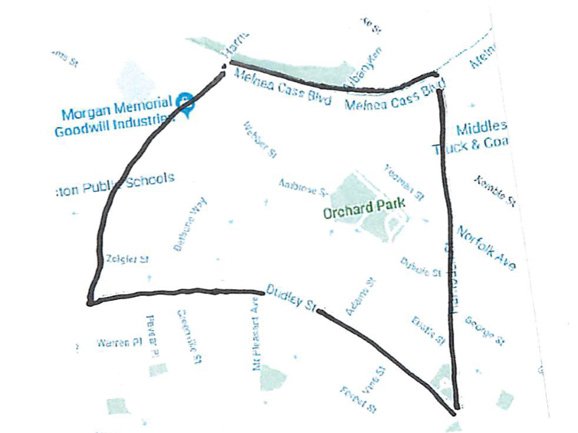
Court-ordered map of Gaines's exclusion zone once he's on probation.
A federal judge this week sentenced Raymond Gaines, 42, to 90 months in federal prison after he admitted he got caught selling crack to an undercover agent three times at South Shore Plaza following his release on an earlier crack-sales conviction.
Gaines pleaded guilty in January to one count of being a felon in possession of a firearm and ammunition, one count of possession with intent to distribute cocaine and one count of possession of a firearm in furtherance of a drug trafficking crime. the US Attorney's office reports. He was arrested last June 1, a loaded gun in his waistband, while still on probation from a one-year sentence related to a 2017 sweep of gang members in the Orchard Park area of Roxbury.
According to an affidavit by a Boston Police officer working with an FBI regional gang task force, Gaines made three trips in his black BMW from his home in Bridgewater to the South Shore Plaza, where an undercover cop got in and bought crack from him in April and May, 2021.
In a sentencing memorandum, a federal prosecutor urged a sentence of 117 months. In addition to the drug selling and weapons, Gaines was also violating his probation on the earlier conviction by repeatedly showing up at Orchard Park, despite a judge's order to stay away from that area, prosecutors say.
The defendant, RAYMOND GAINES, obviously did not get this message from the previous federal sentence imposed in 2018, nor did he get it from his repeated violations, and eventual re-incarceration, with his conditions of supervised release. The defendant has shown that he is not merely an individual possessing a loaded handgun. He is not merely a drug dealer. He is not merely a gang member. He is not merely willingly disregarding the terms of his supervised release. Instead, the
defendant is each and every one of these things.
As part of Gaines's sentence, US District Court Judge F. Dennis Saylor ordered Gaines to stay away from Orchard Park once he's again release on probation. He was also ordered to stay away from a number of specific individuals from Orchard Park.
Gaines's attorney filed a sentencing memorandum, but Saylor agreed to place it under seal because it contained information about his medical history. However, in a public response to the government's memorandum, she denied allegations that Gaines was a member of the Orchard Park Trailblazers gang, that just growin up in that development and being friends with gang members is not enough proof that he was himself a gang member.
| Attachment | Size |
|---|---|
| 228.56 KB | |
| 207.32 KB | |
| 52.33 KB |
Like the job UHub is doing? Consider a contribution. Thanks!
Ad:
Comments
More Federal prosecutions?
By StillFromDorchester
Sat, 02/12/2022 - 12:59pm
Maybe it's just this site covering them but it seems like the Feds get the headline convictions and Massachusetts prosecutors get probation.
Likely related to the DOJ's high standards
By brianjdamico
Sun, 02/13/2022 - 12:30pm
Federal prosecutors have strongly worded guidelines (ref 1) about what standards need to be met before they even think about commencing a prosecution. Federal prosecutors do not bring forward cases unless they have no doubts about their ability to secure a conviction, and in fact most of the cases they do prosecute (90% in 2018, ref 2) result in a guilty plea rather than a conviction by trial.
And from a 2020 report (3):
Basically, if you are facing federal prosecution, your guilt is exceptionally provable and you best start preparing yourself for your prison stay.
At the same time, state level courts see a much wider range of laws and number of cases compared to the federal courts. Without spending half the day looking at definitions and data sets to make sure I'm getting these comparisons completely correct, it looks like the federal courts in 2020 (3) saw 64,565 cases for the entire country, while Massachusetts criminal courts alone in 2020 saw 145,902 cases (4).
So Massachusetts prosecutors see 2 1/2 times more cases than the entire federal court system sees in a year. More cases lead to more variability in outcomes. Different sentencing guidelines and prosecution guidelines can also lead to more variability in outcomes.
Surely there is a published data set, if not a detailed review similar to the federal one I found that shows statistics of outcomes of prosecutions and the sentences imposed but I'm just not coming up with it right now.
(1)https://www.justice.gov/jm/jm-9-27000-principles-f...
(2) https://www.pewresearch.org/fact-tank/2019/06/11/o...
(3)https://www.ussc.gov/research/data-reports/overvie...
(4) https://public.tableau.com/app/profile/drap4687/vi...
Why isn't he excluded from South Shore Plaza?
By Ron Newman
Sat, 02/12/2022 - 7:28pm
since that seems to be where he prefers to commit his crimes?
This time ...
By adamg
Sat, 02/12/2022 - 7:59pm
The first time, it was in the area of Orchard Park. Plus, that's where he grew up and is pals with all these people there - even if he is not a member of their gang.
Add comment